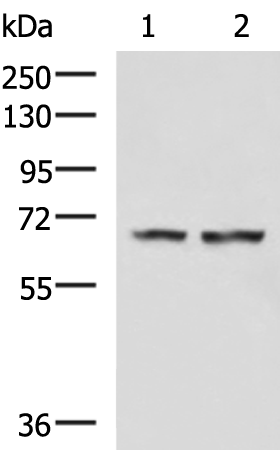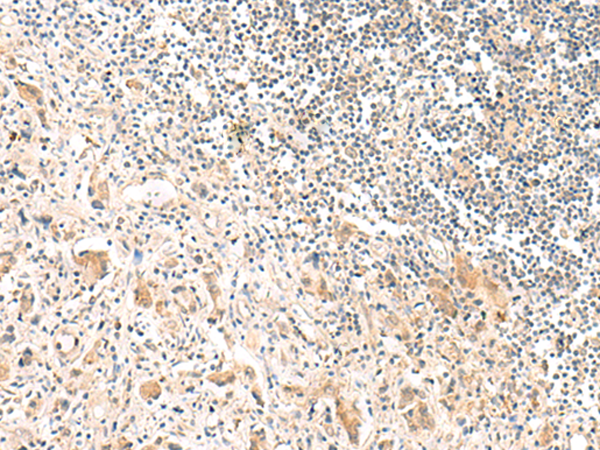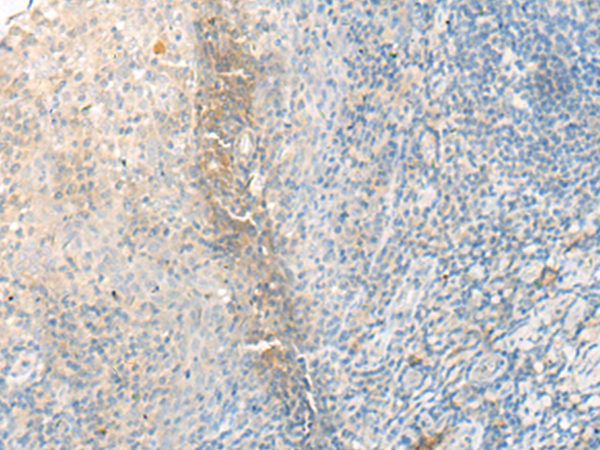


| WB | 咨询技术 | Human,Mouse,Rat |
| IF | 咨询技术 | Human,Mouse,Rat |
| IHC | 1/20-1/100 | Human,Mouse,Rat |
| ICC | 技术咨询 | Human,Mouse,Rat |
| FCM | 咨询技术 | Human,Mouse,Rat |
| Elisa | 1/5000-1/10000 | Human,Mouse,Rat |
| Aliases | TOCA1; C1orf39 |
| WB Predicted band size | 70 kDa |
| Host/Isotype | Rabbit IgG |
| Antibody Type | Primary antibody |
| Storage | Store at 4°C short term. Aliquot and store at -20°C long term. Avoid freeze/thaw cycles. |
| Species Reactivity | Human, Mouse, Rat |
| Immunogen | Synthetic peptide of human FNBP1L |
| Formulation | Purified antibody in PBS with 0.05% sodium azide and 50% glycerol. |
+ +
以下是关于FNBP1L抗体的示例参考文献(仅供参考,具体文献请通过学术数据库查询):
---
1. **文献名称**:*FNBP1L regulates cell polarity and CDC42 activity during collective migration*
**作者**:Roberts, E.C. et al.
**摘要**:研究利用FNBP1L抗体进行免疫荧光和免疫沉淀实验,发现FNBP1L通过调控CDC42信号通路参与细胞极性建立和集体迁移,影响发育过程中的组织形态发生。
2. **文献名称**:*Formin-binding protein 1L (FNBP1L) mediates autophagy-lysosomal degradation via interaction with LC3*
**作者**:Suzuki, T. et al.
**摘要**:通过Western blot和免疫组化实验,证明FNBP1L抗体标记的蛋白与自噬标记物LC3共定位,表明其在自噬-溶酶体降解途径中的关键作用。
3. **文献名称**:*FNBP1L expression correlates with poor prognosis in colorectal cancer*
**作者**:Chen, L. et al.
**摘要**:使用FNBP1L抗体对结直肠癌组织进行免疫组化分析,发现其高表达与患者预后不良相关,提示FNBP1L可能作为癌症治疗潜在靶点。
4. **文献名称**:*Functional characterization of FNBP1L in neuronal dendritic spine formation*
**作者**:Zhang, Y. et al.
**摘要**:通过shRNA敲低和FNBP1L抗体标记实验,揭示其在神经元树突棘形成中的功能,依赖与WASP家族蛋白的相互作用调节细胞骨架重塑。
---
建议通过PubMed、Google Scholar等平台检索最新文献,结合关键词“FNBP1L antibody”、“FNBP1L function”等获取具体研究。
The FNBP1L (Formin Binding Protein 1-Like) antibody is a tool used to study the FNBP1L protein, which plays roles in cytoskeletal regulation, membrane trafficking, and cell signaling. FNBP1L contains an FCH domain and two SH3 domains, enabling interactions with proteins like formins, which are critical for actin polymerization and cell shape dynamics. It is implicated in processes such as endocytosis, cell migration, and neuronal development, with studies linking it to Huntington's disease via interactions with huntingtin.
FNBP1L antibodies are typically developed in hosts like rabbits or mice, validated for applications such as Western blotting, immunofluorescence, and immunoprecipitation. These antibodies help researchers investigate FNBP1L's localization, expression levels, and molecular partnerships in normal and diseased tissues. Dysregulation of FNBP1L has been observed in cancers and neurological disorders, making it a potential biomarker or therapeutic target.
Commercial FNBP1L antibodies often undergo specificity checks (e.g., knockout validation) to ensure reliability. Their use advances understanding of cellular mechanics, disease mechanisms, and pathways involving membrane-cytoskeleton crosstalk, supporting both basic research and drug discovery efforts.
×